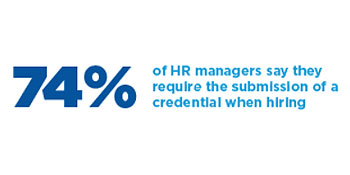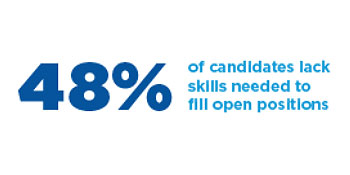Don’t let the name fool you. A microcredential from SUNY is anything but small, and it packs a punch on your resume.
Microcredentials allow students and professionals to learn a new skill in months, not years. They’re often used to make a resume stand out, or to add skill sets that complement what you know. Microcredentials can help employees adjust to changes in their industry, demonstrate that they are ready for advancement, or to help anyone explore a new career or interest.


After earning a microcredential, it can be added to your resume or online profile, as well as shared with your current employer or hiring managers. Focusing on the skills and competencies mastered is a powerful conversation starter in an interview, as well.
As business and industry, communities, community organizations, and educators work to adapt to changes in the economy and workforce—and to keep pace with changes in technology—they need to upskill or retrain workers. According to a survey conducted by the U.S. Chamber of Commerce, 74% of hiring managers agree the market is experiencing a skills gap, saying 48% of candidates lack the skills needed to fill open positions. Furthermore, 74% of HR managers say they require the submission of a credential when hiring.
5 Key Characteristics of a Microcredential
Not all microcredentials and online training courses or skills programs are the same. There are five key characteristics that make a SUNY microcredential—and all those who earn them—stand out in the crowd. SUNY microcredentials are:
- Stackable
- Portable
- High-quality
- In-demand
- Flexible
Stackable
All microcredentials are valuable on their own, by delivering specific new skills, knowledge, and experiences. On top of that, credits earned from SUNY microcredentials can be applied toward a certificate, degree, or advanced degree. Completing one SUNY microcredential puts you well on your way to earning your next credential!
For example, SUNY Adirondack’s Adobe Illustrator microcredential prepares earners for both the Adobe Illustrator ACA certification exam and credits earned count toward meeting the AAS in Media Arts. Working professionals in the field can also pick up this microcredential to fine-tune their skills.
Monroe Community College’s Geospatial Information Systems Technology (GIST) microcredential is the first in a series of three that professionals in the workforce can take to refresh their skillset or upskill. Those new to the field can take all three microcredentials, earn a GIST Certificate and be on their way to completing an AAS GIST degree.
Stackable microcredentials from SUNY can be applied to degree programs at all levels. For example:
- Niagara County Community College’s microcredential in Hospitality and Small Business Management Basics stacks to its AAS degree in hospitality.
- SUNY Canton’s Investigative Analysis microcredential stacks to its Bachelor of Technology in Criminal Investigation.
- Old Westbury’s Estate, Gift & Trust Taxation stacks to its master’s degree program in taxation.
- SUNY New Paltz launched two innovative micro-credentials that both stack to their MBA (Master’s in Busines Administration), a microcredential in healthcare administration and one in music business.
- Buffalo State College’s Applied Creative Thinking and Problem Solving microcredential provides an innovative skillset for today’s managers and it too can stack to an advanced certificate or master’s degree.
Portable
Microcredentials are portable, which means you can take them with you because they are on your transcript and/or recorded in a digital badge as verified proof of your accomplishment. When you apply to a new job or change careers, a badge or college transcript provides hiring managers with proof of your achievement.
High quality
Academic quality is a key feature of SUNY microcredentials, with each one approved through robust processes in the same way that new degree and certificate programs are approved.
In-demand
Every SUNY microcredential is aligned to relevant industry and professional standards, and many incorporate industry or professional certifications.
Examples of in-demand microcredentials include Python-focused microcredentials at Binghamton University and the University at Albany, or a range of microcredentials in IT, cyber, networking and cloud that help earners enter the field or existing professionals stay up to date.
Explore all the microcredentials available to you at SUNY.
Flexible
Students can earn a microcredential in a way that makes sense for them and their time.
SUNY microcredentials can be offered on campus, online, or in a hybrid format, depending on the campus and skills learned. Microcredentials can also be offered at the job site.
Mohawk Valley Community College’s unique faculty-supported Code Academy microcredential, for example, is offered on campus on a flexible schedule, designed with access to on-campus resources.
Columbia-Greene Community College’s Workplace Professionalism microcredential and Fulton-Montgomery Community College’s Business Software and Communication microcredentials are 100% online.
How to Find a Microcredential
SUNY offers more than 400 microcredentials for career changers, alumni, current students, and more. SUNY partners with employers and communities as well to upskill workers and support their personal and professional growth. It takes only months to earn a microcredential to support your lifelong learning journey. A quick search will match you to your first microcredential.




